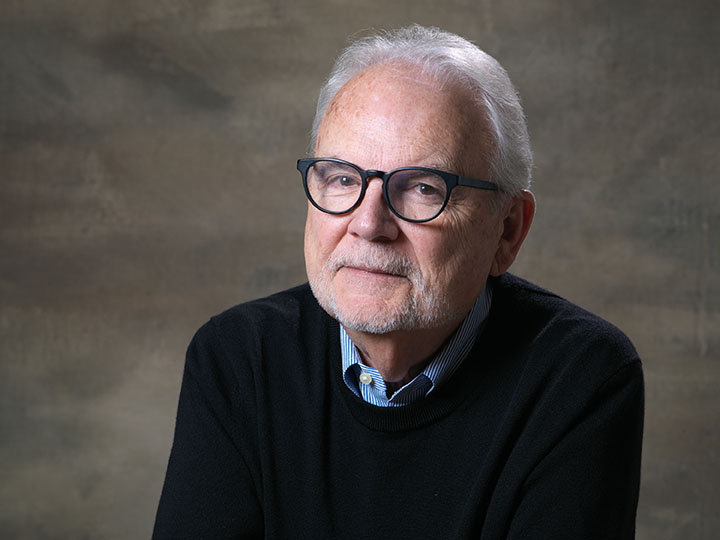Don Carleton, Ph.D.
Executive Director and J. R. Parten Chair
in the Archives of American History

Dr. Don Carleton is the founding director of The University of Texas at Austin’s Dolph Briscoe Center for American History, which was organized in 1991. Prior to the creation of the Briscoe Center, from October 1975 through November 1979, he served as founding director of the Houston Metropolitan Research Center (HMRC), an urban history archives program sponsored by Rice University, the University of Houston, and the City of Houston. At HMRC, he established The Houston Review: A Journal of History and Culture of the Gulf Coast. From December 1979 until 1991 he served as the director of the University’s Eugene C. Barker Texas History Center. A native of Dallas, Texas, Carleton earned his doctorate in U.S. history at the University of Houston.
Carleton has lectured extensively on historical research methods and sources, the history of American news media, and twentieth century U.S. political history. He has worked as a historian, lecturer, and researcher in Nicaragua, Australia, Japan, the United Kingdom, France, Italy, Israel, the Czech Republic, Poland, and Romania. As a historian, Dr. Carleton has authored 13 books, including Red Scare (Texas Monthly Press, 1985), which won the Texas State Historical Association’s Coral Tullis Award for the most important book on Texas published in 1985. The University of Texas Press reprinted Red Scare in 2016. His book, A Breed So Rare: The Life of J. R. Parten, Liberal Texas Oil Man, 1896–1992 (Texas State Historical Association, 1998) received the Texas Institute of Letters award for the book written by a Texan in 1998 that made the greatest contribution to knowledge. His other books include Being Rapport: Capitalist with a Conscience (University of Texas Press, 2002); Dolph Briscoe: My Life in Texas Ranching and Politics (Center for American History, 2008); Big Red: Memoirs of a Texas Entrepreneur and Philanthropist (Briscoe Center for American History, 2010); Ross Sterling, Texan: A Memoir by the Founder of Humble Oil and Refining Company (University of Texas Press, 2007); and Conversations with Cronkite (foreword by Morley Safer, University of Texas Press, 2010), and Struggle for Justice: Four Decades of Civil Rights Photography (University of Texas Press, 2020). His most recent book is The Governor and the Colonel: A Dual Biography of William P. Hobby Sr. and Oveta Culp Hobby (University of Texas Press, 2020). He also has published numerous articles in professional journals, magazines, and newspapers and he serves as editor for the Focus on American History Series at the University of Texas Press. Carleton was an historical advisor to novelist James A. Michener for his novel Texas (Random House, 1986). He also was a researcher and historical advisor for former CBS newsman and news anchor Walter Cronkite’s best-selling memoir A Reporter’s Life (Knopf, 1996).
Carleton has worked in various capacities in the field of historical documentaries. He was the executive producer of the award-winning When I Rise, which premiered at the SXSW Film Festival in Austin, Texas, in March 2010 and was later broadcast nationwide on PBS, as well as on national public television networks in Europe and in Israel. He also was the executive producer of and historical advisor for the documentary film,Cactus Jack: Lone Star on Capitol Hill (2016), which was also broadcast nationwide on PBS. His other documentary work includes service as a historical advisor and/or commentator for the mini-series Cronkite Remembers, produced by the Cronkite-Ward Company for the Discovery Channel (1997); JFK: Breaking the News, produced by KERA TV in Dallas (2003); For the Sake of the Song, produced by Fair Retail Films (2010); The President’s Photographer, produced by the National Geographic Television Channel (2010); Raise Hell: The Life and Times of Molly Ivins, produced and directed by Janice Engel and distributed by Magnolia Films and streamed on Hulu (2019); and Porvenir, Texas (2019) produced by Roadwings Entertainment and distributed by PBS.
As an oral historian, Carleton has recorded hundred of hours of audio and video interviews with a wide range of interviewees. His series of oral history interviews with Walter Cronkite over a period of two years served as the basis for A Reporter’s Life. During Lloyd Bentsen’s two-year tenure as Secretary of the Treasury (1993-1995), Carleton served as his oral historian. He served from 1996 until 2009 as an oral historian and advisory board member for the Academy of Television Arts and Sciences’ Foundation’s “Pioneers of Television” project for which he conducted in depth biographical interviews with more than two dozen major figures in the history of broadcast news, including David Brinkley, Andy Rooney, Ed Bradley, Barbara Walters, Jim Lehrer, and Daniel Schorr, as well as with religious broadcasters Jerry Falwell and Pat Robertson, and entertainers Fess Parker and John Forsythe. All are available for viewing on the foundation’s website.
Dr. Carleton has curated several exhibitions, including exhibits featuring the photography of David Hume Kennerly: Photo Op (1996) at the Portland (Oregon) Art Museum, the Gallery of the Cannon House Office Building, Washington, DC, and the Carter Presidential Library in Atlanta; and Photo Du Jour (2002) at the Smithsonian Museum’s Arts and Industries Building, in Washington, DC. He also served as the principal curator for the major exhibit Cronkite: Eyewitness to a Century, which was displayed at the LBJ Presidential Library and Museum in Austin in 2010. His work as an exhibits curator also includes Struggle for Justice, featuring the Briscoe Center’s photograph collections documenting the Civil Rights Movement of the 1950s and 1960s; and Flash of Light/Wall of Fire, featuring original images taken by Japanese photographers documenting the immediate after effects of the atomic bombing of Hiroshima and Nagasaki.
Carleton holds the university’s J. R. Parten Chair in the Archives of American History. Listed in Who’s Who in America, he has been honored with membership in the Texas Institute of Letters, the Austin Headliners Club, and the Philosophical Society of Texas. In 2015, the Texas Democracy Foundation honored him with its Bernard Rapoport Award.


